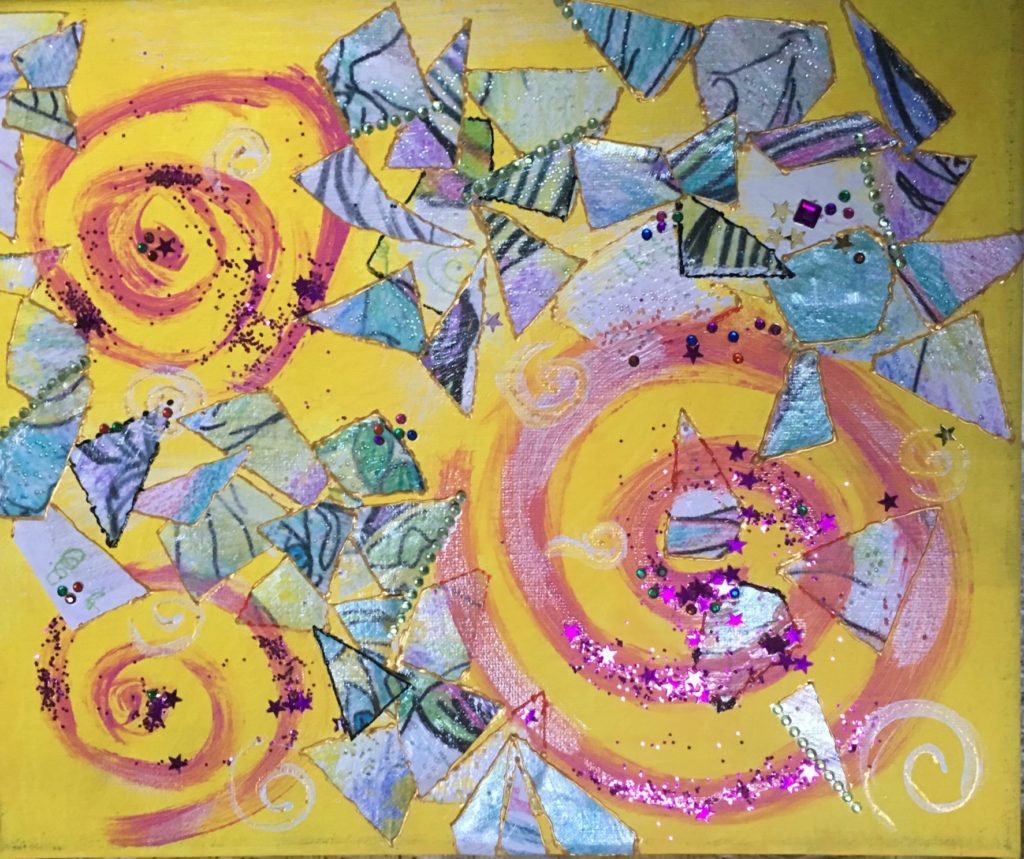
At the start of the year I felt the need to go into a more formal process of emotional exploration again. Every once in a while it is prudent for psychotherapists to go beyond the self-processing that comes so easily to many of us. However, as a therapist I find that processing in words is something that I do rather well on my own — and that there are limits that I can’t seem to overcome easily in talk therapy. And so I looked for an art therapist and found a wonderful one in Midland. The process has been refreshing, eye and heart opening, and deeply healing so far.
In one of my first sessions I was exploring my foundation of my inner strength. It wasn’t a big surprise to me to find that this foundation rests largely in my friends. Good friends are like balm to the soul, like mirrors, like pillars and bedrock, especially when life gets rough; and I count myself deeply blessed to have in my life a good handful of extra-ordinary women and men I count as friends.
What did surprise me, though, was just how deep that connection seemed to go. As I explored the theme of friendship it became apparent that not only is friendship a place of strength, love, and support for me; it is in many ways what defines me as a person. And the more I thought about it, the more I thought this likely applies to other people. Let me explain:
I am aware that, like most people, I wear slightly different “masks” depending on where and with whom I am. Most of us present a different in an important business meeting as compared to at home with the family. We may put on a bit of extra “armour “when we go to see the family, or we may feel like we can let go of all the “armour” when we are back in mom’s kitchen. We are a bit more careful in our presentation when we go on a first date. You get the idea.
The thing is, we do not only present differently in all those situations, we often actually feel differently. Business coaches teach people how to dress, stand, and move in order to feel more confident — and for most people those techniques work. There are people who have “lucky ties” or “lucky dresses”, not because there is an actual spell in the piece of garment but because those people feel more confident when they are wearing the piece of clothing and remember their successes from before. There also are various instructions to “fake it till you make it”: again, not because lying is in any way helpful but because how we present and act has an impact on how we feel inwardly.
Being with our friends is no exception from this general rule: we will choose our masks (or presentation) depending on the person(s) surrounding us. With true, good friends, however, the presentation can come closer to our true, whole, complete self; the masks are fewer or thinner. Our friends, if they are true and good friends, will accept us with our blemishes and shortcomings, and will hold us a true and faithful mirror when we mess up — or when we think we messed up and they just can’t see that.
In this way, when we are with true friends, we slowly can learn to present in the most real way all of who we are. Most likely we will still have parts that don’t come out much with one friend but are there with another: the nature lover may not get much “screen time” when we are with the friend who loves everything theatre but has a serious allergy to wildlife; the music lover may not discuss much with the avid cook. But no matter with whom I — the music and nature loving, theatre buff who loves to cook — meet, they all know and accept and shine back the parts of me that are presented; and in this shining back, this mirroring, I can come to understand the essence of this music and nature loving, theatre buff who loves to cook–Me.
This, in turn, becomes defining because as I see the true parts mirrored back, I also see those parts that I present and that are fake, that aren’t me. Usually this happens through those “mis-understandings” and fights that are part of any friendship: the times where what we say doesn’t seem to be heard and understood or when we feel attacked or mistreated by a friend.
Sometimes those attacks and mistreatments are true and real. Then we can learn that maybe we didn’t fully understand the other, maybe didn’t pay attention, maybe weren’t courageous enough to walk away when things became unbalanced and unreal. Sometimes those attacks and mistreatments are simply misunderstandings because we insist on showing a mask while our friend is sensing the person behind it and wants to see that person. Either way, true friendship will allow for at least some resolution of those events and through this, again, helps us get closer to who we are.
In the end the Self can’t live in isolation. It needs the Other to reflect it, support it, and correct it. It needs the Other to be of service: a Self that isn’t of service in some kind of way dries out quite quickly. And so, I realized in that one session and the weeks that followed, that I am, truly, reflected and shaped in the eyes of my friends and carried safely in their hands: protected and reflected in the best and truest way; a mosaic of reflections, not all shiny and bright, that when put together shows me the image of Me, if I just dare look.
To all my wonderful friends (you know who you are): thank you for being true and clear mirrors and for carrying me so gently and securely.

